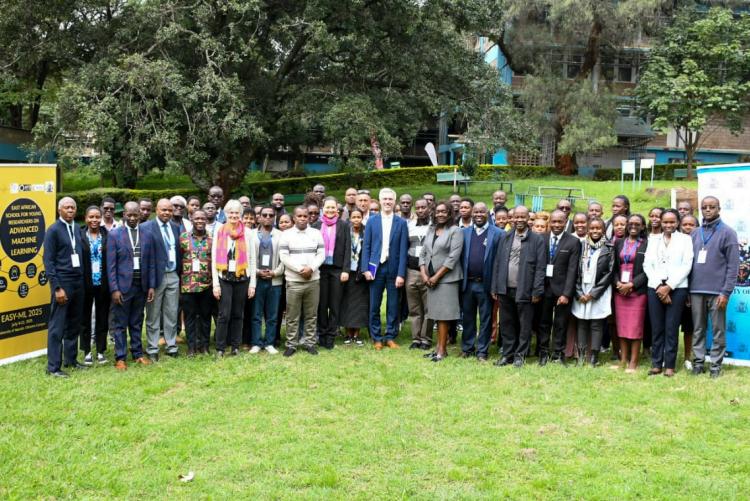The East-African School for Young Researchers on Advanced Machine Learning Techniques (EASY-ML 2025) officially opened at the University of Nairobi on July 9th, marking a significant milestone in interdisciplinary research training in Africa. This prestigious two-week residential program, running from July 9 to 22, brings together 40 early-career researchers and postgraduate students 30 from Kenya and 10 from neighboring countries spanning diverse fields such as physics, biology, chemistry, geosciences, and economics.
In her opening remarks, Prof. Sheila Okoth, Associate Dean at the Faculty of Science expressed gratitude to the Department of Physics and the Department of Computing and Informatics for their leadership and partnership in hosting the school. Prof. Okoth also acknowledged key funders and partners, including the French National Centre for Scientific Research (CNRS), Agence Française de Développement (AFD), the Engineering and Science Complex (ESC), Kenya Education Network (KENET). The school reflects the University of Nairobi's commitment to fostering innovative, interdisciplinary research and global collaboration. “Machine learning is no longer a niche discipline,” Prof. Okoth emphasized. “It is now central to tackling real-world problems, from climate science to economics.”
Dr. Ian Kaniu, Co-Director of EASY-ML and senior lecturer in the Department of Physics, provided context on how this initiative builds on the success of the 2024 SCoTeP-K workshop. He noted that EASY-ML is the result of a highly coordinated effort by researchers from Kenya and France. He further noted the training boasts of a well-curated curriculum that combines theoretical grounding with hands-on coding labs, tutorials, and group work.
Prof. Mwabora, representing the Chair of the Department of Physics, emphasized the department's focus on data-driven and computational research. He applauded the school’s commitment to interdisciplinary learning and extended appreciation to all collaborators.
The Chair Department of Computing and Informatics, Prof. Kahonge highlighted the transformative role of machine learning as a driver of multidisciplinary research and innovation. He noted that the department is in the process of introducing a Master of Science program in Artificial Intelligence, which will further institutionalize advanced AI training in Kenya. He emphasized that initiatives like EASY-ML are timely and essential in laying the groundwork for such academic programs, while also deepening international collaboration particularly with French partners who have been instrumental in supporting curriculum development and research exchange.
Representing KENET, Prof. George Amolo highlighted KENET’s dedication to empowering young researchers through grants and digital infrastructure. “Dr. Kaniu himself is a testament to this commitment, being a recipient of our grant in 2023,” he noted. Prof. Amolo also reaffirmed KENET’s vision of building infrastructure for cutting-edge, globally competitive AI systems that can elevate Africa’s scientific capabilities.
Dr. Benoît Hazard, Director of the CNRS Africa Regional Office, provided a broader perspective on France’s investment in African science. “CNRS is the largest research organization in France, and our presence here in Nairobi underscores our dedication to reshaping scientific collaboration with Africa,” he said. He praised the school for embodying CNRS's goal to foster a new generation of African researchers and support over 100 research projects across the continent.
Dr. Lauric Cécillon, Attaché for Science and Higher Education at the French Embassy in Kenya and Somalia, lauded the EASY-ML summer school as a flagship achievement in Kenya–France scientific collaboration. He highlighted the initiative’s alignment with the Science and Engineering Complex (ESC) at the University of Nairobi a strategic project co-developed with the Agence Française de Développement (AFD). The ESC focuses on research-driven STEM training and aims to equip African scientists and engineers with the skills to drive innovation, address global challenges, and create sustainable jobs. Dr. Lauric emphasized that artificial intelligence is a core focus area within the ESC and that initiatives like EASY-ML showcase how bilateral science diplomacy can produce meaningful, high-impact outcomes. He also reaffirmed France’s commitment to supporting women in STEM and fostering inclusive scientific ecosystems.
Finally, The opening ceremony set the stage for an intensive and transformative program. Over the next two weeks, participants will dive deep into machine learning topics such as linear regression, neural networks, PyTorch, convolutional and graph neural networks, transformers, and generative models. They will also engage in debates, ethics sessions, and hands-on coding exercises using real-world datasets.
The East-African School for Young Researchers on Advanced Machine Learning Techniques is more than a workshop it is a platform for future innovation, a bridge between continents, and a launchpad for Africa’s next generation of scientific leaders.
- Log in to post comments

